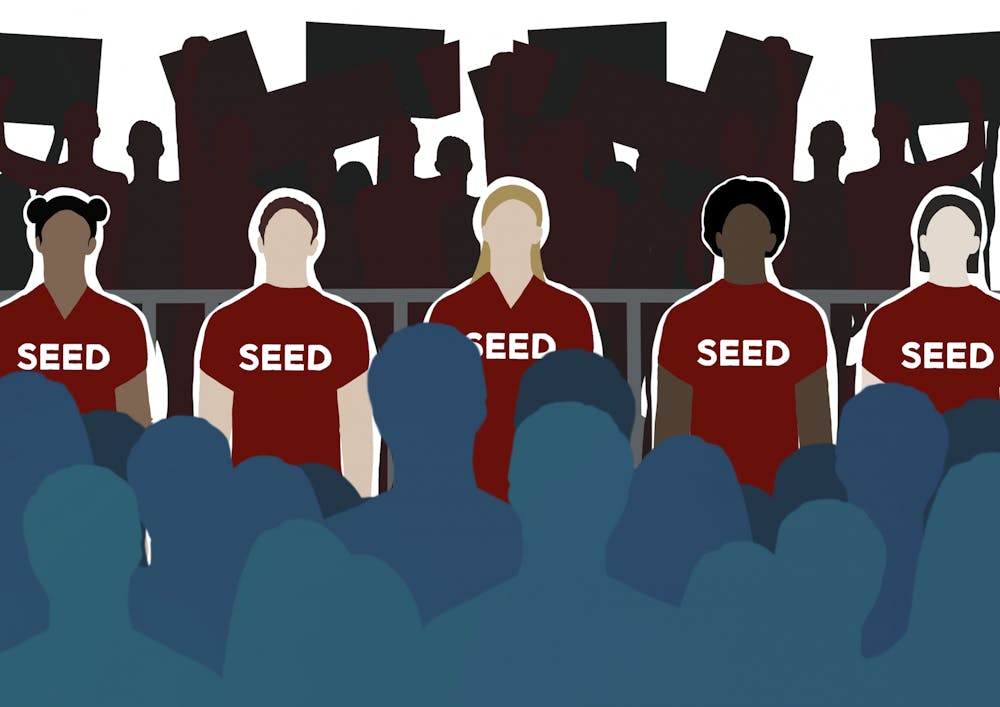The university created a group called Safety Engaging in Expression Delegates (SEED) in response to two demonstrations from off-campus groups that occurred on campus last semester.
SEED members will attend demonstrations and protests to help students understand why and how these events are allowed to happen on campus. Any faculty, staff and students can join, and training will start this January, according to Shay Malone, the director of the Office of Multicultural Student Affairs.
Training for SEED will incorporate an overview of how the First Amendment applies to a public university’s campus, a review of university policy and procedures and studies explaining how to respond to demonstrations and events.
SEED is modeled after other schools with similar programs, including Texas A&M, the University of Wisconsin-Madison and the University of Mississippi, Malone said.
“We understand that these happen often, not just on our campus, but other places,” Malone said. "Why not follow the model and use best practices to make sure that people are safe on campus?"
Marc Shook, the dean of students, said he believes the need for SEED has come from the increase in student involvement in these events, specifically the ones that arose last fall.
Shook said he thinks for the SEED initiative to happen, there should be student input, as well.
“If we are going to actually look at a group of people that are trained in this area that can help staff these events, and if we're going to do that, let's have some student input if they want to be involved,” Shook said.
A partnership and collaboration between law enforcement officials and SEED is anticipated, but they have different responsibilities in response to such activities.
“Anytime that somebody breaks the law, that's when USCPD steps in,” Malone said. “That is their role— to ensure that nobody breaks the law. There is only so much, as part of the community, that we can do ... So, that is where they come in.”
The director of Russell House, Kim McMahon, said one advantage of SEED is that it allows for more peer engagement and mutual control, which she called "most valuable and most impactful."
Morgiana McDevitt, the Student Government chair of the health and safety committee, said the university is right in implementing this initiative.
"I think the fact they are doing something is just as important whether it's now, whether it was three months ago, whether three years from now,” McDevitt, a third-year environmental studies and economics student, said.
McDevitt said there is only so much the university can do, but it should encourage students to disengage.
"The more they engage, the more willing they are to come back to campus," McDevitt said.
Third-year criminal justice student Jasmine Portee said she feels the efforts should be focused more on the outsiders who come onto campus and that the university should update its policies.
"I feel they are abusing the fact that, 'OK, I can say whatever I want,' but they do also have to understand that this is a college campus," Portee said.
Groups and individuals are required to provide an overview of what they intend to do and what their message is to Russell House in order to obtain a space reservation for Davis Field, the Russell House back patio and the portion of Greene Street in front of Russell House.
However, roads and intersections adjacent to Russell House are regulated by the City of Columbia rather than the university. Any group that wishes to come onto campus must comply with the Off-Campus Speakers policy.
According to the STAF 3.12 Off-Campus Speakers policy, "the campus is open to free discussion and the examination of views and ideas” as long as the means of discussion and meeting are peaceful.
"We can always be informed of what their message that they will bring is, but we don't review and choose to place them based on that content because that would be a violation of the First Amendment," McMahon said.

